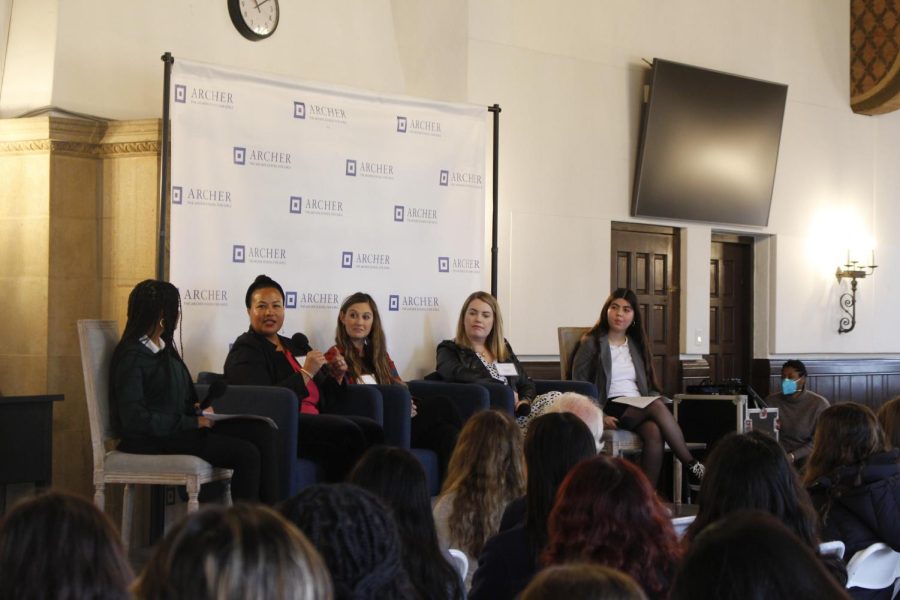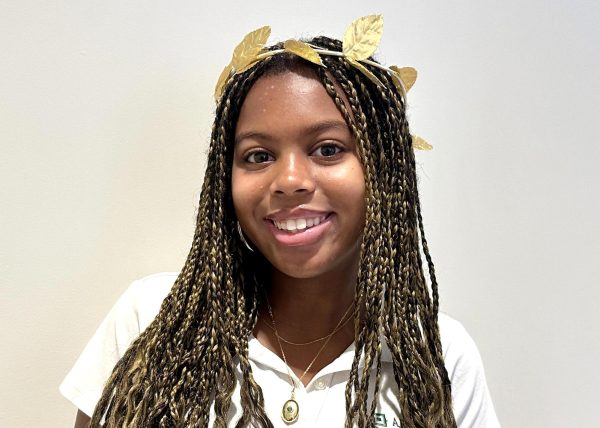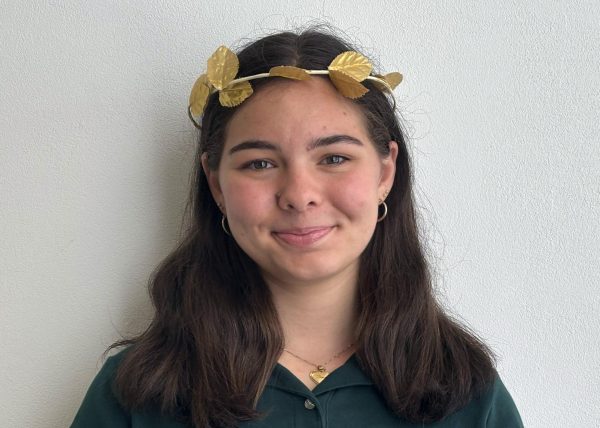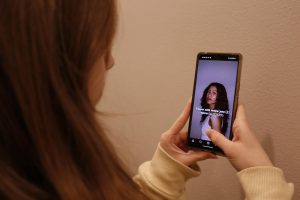EBAD hosts panel on anti-bias, presenters advise on having difficult conversations
Photo credit: Siena Ferraro
Paramount Global’s Executive Vice President of Entertainment Diversity and Inclusion Tiffany Smith Anoa’i, advocate for justice and equality Sofia Shield and Education Director at the Anti-Defamation League in Southern California Megan Nevels speak on the Anti-Bias Panel in the Zeller Student Center. The panelists gave suggestions for navigating difficult conversations surrounding bias Feb. 24.
March 12, 2023
Archer’s upper school gathered in the Zeller Student Center Feb. 24 to hear from three women who work to fight against bias in their professional lives. They gave students advice and guidance on having difficult conversations about diversity.
The panel consisted of Education Director at the Anti-Defamation League in Southern California Megan Nevels, former co-chair of Tufts Against Genocide and advocate for justice and equality Sofia Shield and Paramount Global‘s Executive Vice President of Entertainment Diversity and Inclusion, Archer Board of Trustees Co-Chair and alumna parent Tiffany Smith Anoa’i. The members of the Executive Board of Advocacy and Diversity Lizette Gonzalez (’23) and Piper Porter (’24) moderated the panel.
The panelists discussed the importance of learning how to engage in difficult conversations surrounding bias. Anoa’i explained that her work gives her the opportunity to challenge bias and injustice and give representation to often underrepresented communities. Anoa’i discussed the importance of representation in the entertainment industry and the impact it had on her when she was younger. She recalled seeing Jayne Kennedy, a Black woman, as a journalist on television.
“In entertainment, intersectionality is where the representation meets what we see on television [and] who gets to tell those stories,” Anoa’i said. “What really resonated with me was that she looked like me — as soon as I saw a reflection [of myself] represented, I knew I wanted to do something that includes others.”
Shield discussed being the granddaughter of a Holocaust survivor and how the direction of her work is to keep their stories alive. For her, part of that effort is spreading awareness and educating people about the Holocaust and its lingering effects on society.
“[Holocaust survivors] didn’t go through that horrible experience for people to forget about it,” Shield said. “We need to keep talking about it so it never happens again.”
Nevels described her experience growing up in Inglewood, a predominately Black area in California, and addressed common stereotypes that go along with living there. Her personal experience with being stereotyped set her DEI endeavors in motion.
“A lot of people assume that someone who looks like me would live there,” Nevels said. “I grew up in an entirely Black neighborhood, and I noticed the ways in which people that looked different from me were being treated.”
The panelists explained how their upbringing and background have shaped their work and passions. Shield shared how her experience of being a student at Marlborough, an all-girls school, has fueled her determination and made her more confident in pursuing her ambitions.
“It created a safe space to get uncomfortable and to connect with people who are different from me in a supportive and safe environment,” Shield said.
Nevels also discussed how to navigate difficult conversations about diversity and bias during a time of cancel culture and how to take initiative to improve in the future and take responsibility for any mistakes.
“Own your impact — it doesn’t matter what your intention was. The first thing to do is to acknowledge it and do the work to never say that again,” Nevels said.
The panelists expressed that working to advance diversity and equity can be tiring and stressful. Shield suggested reflecting on the impact to solve this problem.
“When you remember the bigger picture of what you’re working for it really helps,” Shield said. “You don’t have to fight every fight at once.”
Towards the end of the panel, students were given the opportunity to ask questions about how they can get involved in working towards diversity and make an impact in relation to anti-bias. Anoa’i urged upper school students to take action as soon as possible by utilizing every opportunity they can to make change.
“Archer provides you with access to people and opportunities — talent is universal, opportunity is not,” Anoa’i said. “Those are my north stars and things I would like to see you utilize.”
Shield expressed the significance of younger people having in-depth, transparent communication about diversity.
“You all bring a different perspective. Coming at these world issues with a fresh set of eyes is an amazing opportunity to advocate for equity,” Shield said. “That is a challenge that I am excited for you to tackle.”










